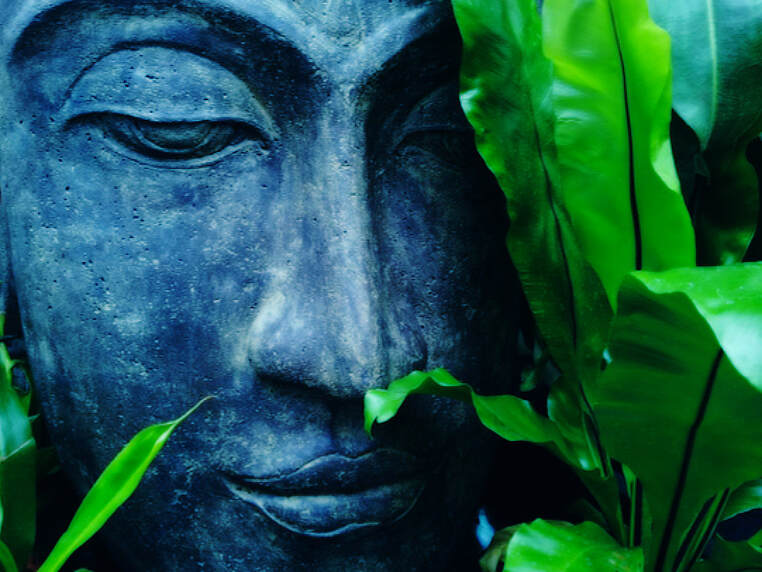A deeper investigation into the origins and psychological benefits of these two contemplative practices presents a more complex picture. Understanding Prayer and Meditation Prayer is often a personal communication with a higher power, which may contain a plea, yearning, or request. Prayer may also contain thanks and praise for God or another divine power outside of ourselves. Prayer can be done alone or as a community. Neuroscientists find that our brains display similar patterns of blood flow when we are in prayer as when we are in conversation with another person.1 In other words, prayer is about connecting and communicating with a force or divine power outside of ourselves. Meditation lacks the relational quality of prayer. Instead, meditation aimed at expanding and enriching our sense of the ever-changing present moment. Meditation is not about speaking to God, but being quiet enough to allow yourself to hear silence and space. In my personal meditation practice, I experience this as the collective space shared by all of humanity. It’s a mental technique to go to the source of your thoughts. Meditation is about becoming familiar with the thousands of thoughts passing through our minds on a daily basis. Practitioners aim to slow down rapid thoughts and create a small gap of calmness. To me, meditation is an opportunity to grow our mindful awareness of the present moment. It allows us to expand upon the moment and be fully present with it. Meditators often use the breath as an always-present anchor to bring your thoughts back ‘home’. Quiet meditation produces none of the temporal lobe or language area activation seen in prayer. As meditators focus on the breath or another object of contemplation, they display an increase in frontal lobe activity (signaling attention) and a decrease in parietal lobe activity.1 As our parietal lobe is responsible for sensing our position in relation to our environment, brain scan data seems to support meditators’ reported experiences of expansion and being at one with the universe. Fascinatingly, practices of prayer and meditation are not divided along religious or secular lines. Historically, practitioners of the theistic religions - whose followers profess belief in God - including Christianity, Judaism, and Islam, engaged in both prayer and meditative practices. These traditions continue today among those in monastic life as well as laypeople of faith. While nontheists such as a Buddhists do not have a creator god, these religious traditions practice forms of meditation that blur the lines between secular meditation and communicative prayer. The Benefits of Contemplation Both prayer and meditation practices have scientifically-proven psychological and physical benefits. The two contemplative practices involve mindful silence and solitude. These practices -meditation can help you escape the grip of overpowering negative emotions.  Prayer is rooted in the belief in an external higher power. As such, scientific studies on prayer find that atheists fail to realize the same benefits from prayer as believers. While the scientific literature on prayer is less abundant than studies on meditation, prayer’s proven benefits include an increased sense of social connection. More social connection comes with a host of benefits including a stronger immune system. Psychologists have also demonstrated that prayer increases self-control in a laboratory setting.2 Study participants who were emotionally-depleted by a challenging emotional suppression task showed better performance on a psychological test requiring sustained attention and self-control if they prayed briefly. Unsurprisingly, only believers reaped these benefits from prayer. Like prayer, meditation is proven to enhance immune system performance and focus. The research literature on meditation practices points to many other benefits, including improved mood, enhanced cognitive skills, better decision making, and lowered stress. Should I pray or meditate? Both prayer and meditation have benefits. However, early evidence suggests that faith may be a necessary precondition for reaping the benefits of prayer. An atheist praying is unlikely to experience a sense of communion with God or cultivate a greater sense of self-control. Although meditation is a part of every spiritual tradition, from Christianity to Buddhism, meditation is not necessarily a religious practice. Unlike prayer, meditators need not have faith in a higher power to reap brain and body-boosting benefits from practice. Religious and non-religious people alike can both benefit from meditation. Different religious traditions blend prayer and meditation (such as the centering prayer used by Benedictine monks), and religious lay people may enjoy these sort of practices as well. Neuroscientists have found that both prayer and meditation create lasting changes in our brains. But are these changes is this achievable outside of monastic life? What is the ‘therapeutic dose’ to see the benefits of prayer and meditation? New studies suggest that just 30 minutes of daily practice leads to noticeable changes in brain function after 2 weeks.3 Other employer-based studies have shown promising results in cognitive performance following just a few minutes of daily meditation.3 It seems that almost everyone can improve their overall wellbeing and improve their brain function through regular meditation or prayer. As we know, habits can be very difficult and slow to change. We must train ourselves deliberately and create new cues and rewards to help us succeed in changing a habit. Having clear goals helps the process. One of the primary factors to reaping the benefits of prayer or meditation in consistency. Start small, practice, repeat. Experienced practitioners recommend beginning with as little as 2 minutes of prayer or meditation at a set time each day. Such small bursts of concentration allow you to channel your enthusiasm into keeping consistency rather than sustaining a lengthy practice, setting you up for longer-term success. To reap the benefits of practicing, don’t expect a particular outcome from either prayer or meditation. Stay open and focus on the act of prayer or act of meditation rather than the result. Any activity, whether prayer and meditation or learning sports-related skill, paves new connections in the brain. But these types of brain changes don’t happen overnight, so don’t expect to see improvements in thinking or mood immediately. Gradual improvements in mood, thinking, or focus can be difficult to notice. In fact, many meditators report only noticing the profound differences meditation practice has on their lives after they miss a few meditation sessions. Neuroscientists often use Donald Hebb’s maxim ‘neurons that fire together, wire together’ to describe this long-term brain change. Repeated practice creates repeated patterns of neural activity, which strengthen those neural pathways. Regular practice of prayer and meditation paves these new paths in the brain. Remember that both meditation and prayer are forms of general conditioning, creating a stronger brain and body for other daily activities such as emotional control and concentration. Consistent practice puts you in a mind state of connection & peacefulness which we can all use a bit more of these days! Dr. Ilene Naomi Rusk is co-director of the Healthy Brain Program in Boulder, Colorado and is coordinator of the rehabilitation and trauma treatment programs. She has a Ph.D. from the University of Birmingham in England (Psychology, Neuropsychopharmacology) and has authored numerous papers in psychology, neuropharmacology and neuroscience as well as other related topics. Dr Rusk is known for her integrative approach to mental health and her dedication to looking for root causes of cognitive decline. References: 1. Bradley-Hagerty, B. (2009). Prayer May Reshape Your Brain … And Your Reality. NPR. 2. Valdesolo, Piercarlo. (2013). Scientists Find One Source of Prayer’s Power. Scientific American. 3. Reynolds, G. (2016). How Meditation Changes the Brain and Body. New York Times.
10 Comments
2/14/2022 07:00:24 am
Thank you for sharing informative content. It means a lot to me hope you do more articles to post.
Reply
8/29/2022 03:36:32 pm
I'm so happy that you appreciate the article. I hope it helps you along your healing journey. Thank you Dr. Gazda for sharing my article!
Reply
Deame Romero
2/19/2024 06:15:06 am
There is a permanent cure for HSV1&2 and Dr Osato herbal medicine is the perfect cure for herpes and i have used it and i was cured from HSV1&2.The cure works perfectly with no side effects. Please i urge you to contact Dr Osato now and get the cure from him through his email address: [email protected] . His website is osatoherbalcure.wordpress.com and he is capable of curing HIV/AIDS, HERPES, HPV, HSV1&2, COLD SORE, CANCER of all kinds,DIABETES and so many other infections. Your perfect healing towards humanity is incomparable keep up your good work Dr Osato. His natural herbs for herpes work perfectly. .
Reply
3/4/2022 08:34:34 am
I very much appreciate it. Thank you for this excellent article. Keep posting!
Reply
8/29/2022 03:38:30 pm
So happy that you are enjoying Dr. Gazda's wonderful website and I thank her for sharing my article! I hope it helps....
Reply
4/7/2022 04:57:58 am
It's fascinating how praying to God and getting closer to him could help you get over a mental rut that might be affecting your thinking. I first learned about God on a couple of flyers I received while walking around a church. I think my friend could use God's guidance for his anxiety.
Reply
After reading this article, I found the information about how Botox works to be particularly interesting. By doing Botox treatment, it effectively prevents the activation of pain networks in the brain. This mechanism of action sounds promising and could potentially provide much-needed relief for chronic headache sufferers. Thank you for sharing this informative piece! https://officialsp5derr.com/tracksuits/
Reply
Deame Romero
2/19/2024 06:14:43 am
There is a permanent cure for HSV1&2 and Dr Osato herbal medicine is the perfect cure for herpes and i have used it and i was cured from HSV1&2.The cure works perfectly with no side effects. Please i urge you to contact Dr Osato now and get the cure from him through his email address: [email protected] . His website is osatoherbalcure.wordpress.com and he is capable of curing HIV/AIDS, HERPES, HPV, HSV1&2, COLD SORE, CANCER of all kinds,DIABETES and so many other infections. Your perfect healing towards humanity is incomparable keep up your good work Dr Osato. His natural herbs for herpes work perfectly.
Reply
Your comment will be posted after it is approved.
Leave a Reply. |
AuthorSelected writings from our professional community. Archives
July 2023
Categories |

 RSS Feed
RSS Feed